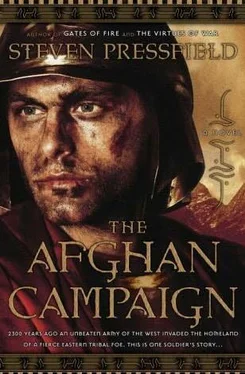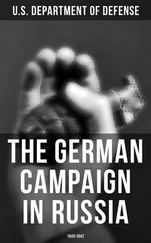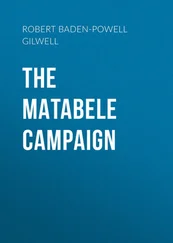Steven Pressfield - The Afgan Campaign
Здесь есть возможность читать онлайн «Steven Pressfield - The Afgan Campaign» весь текст электронной книги совершенно бесплатно (целиком полную версию без сокращений). В некоторых случаях можно слушать аудио, скачать через торрент в формате fb2 и присутствует краткое содержание. Жанр: Исторические приключения, на английском языке. Описание произведения, (предисловие) а так же отзывы посетителей доступны на портале библиотеки ЛибКат.
- Название:The Afgan Campaign
- Автор:
- Жанр:
- Год:неизвестен
- ISBN:нет данных
- Рейтинг книги:4 / 5. Голосов: 1
-
Избранное:Добавить в избранное
- Отзывы:
-
Ваша оценка:
- 80
- 1
- 2
- 3
- 4
- 5
The Afgan Campaign: краткое содержание, описание и аннотация
Предлагаем к чтению аннотацию, описание, краткое содержание или предисловие (зависит от того, что написал сам автор книги «The Afgan Campaign»). Если вы не нашли необходимую информацию о книге — напишите в комментариях, мы постараемся отыскать её.
The Afgan Campaign — читать онлайн бесплатно полную книгу (весь текст) целиком
Ниже представлен текст книги, разбитый по страницам. Система сохранения места последней прочитанной страницы, позволяет с удобством читать онлайн бесплатно книгу «The Afgan Campaign», без необходимости каждый раз заново искать на чём Вы остановились. Поставьте закладку, и сможете в любой момент перейти на страницу, на которой закончили чтение.
Интервал:
Закладка:
I see that he loves me. My eyes sting.
“Forgive me, Philip. But Elias himself would have dodged that duty.”
For the first time, my brother smiles. His beard, I see, has gone gray. His hair, once raven, is the color of iron. I note from his gait that both knees have gone stony (from wounds perhaps, or falls, as is not uncommon among horsemen). I have brought wine for him as a present, and a duck in a sack. For me, Philip carries Elias’s regimental sash, of wool dyed black and tan.
He tells me how Elias died and what happened to Daria.
“In custody, the woman tried to make away with herself, chuffing down some poison she had smuggled past the guards. The surgeons flushed her gut, so she could be properly executed. She was the first Afghan woman to be charged before a military tribunal. She offered no defense and refused to make a statement of any kind. They crucified her.”
My brother has seen Shinar too. “She sought me out at my quarters at Bactra City. I thought she was some shepherdess. When she opened her mouth and good Greek came out, I nearly keeled over. Then she showed me her oikos papers with your name on them.” He laughs. “I said to myself, ‘My baby brother is all grown up.’”
It is through Philip’s intercession that Shinar (and Ghilla and Lucas’s baby) have been documented through to Maracanda. They will arrive with the heavy baggage, probably in ten days. Too late for me; I’ll be a hundred miles east, up in the Black Beards, by then.
“How much time,” my brother asks, “do you have left on your enlistment?”
I tell him. “Why?”
“We’ll tear it up. I want you out of harm’s way.” He’s serious. Strings can be pulled. “What makes you stay in this pit of hell?” Philip demands. “Duty? Love of country? Please spare me any oraculations on the subject of Macedonian honor. Money? Let me guess: You owe the army more now than you’ve earned in your entire enlistment.” He faces me in vexation. “I don’t understand you, Matthias. Is your aim to cast your life away?”
I ask why this is so important to him.
“I will not,” he says, “lose another brother.”
We have to get out of the public way. We’re making a scene. Along the riverbank stands a slope where the muleteers unkink their new ropes; for hundreds of yards there’s nothing but wet lines stretching in the sun. “Philip,” I say when we have walked down, “you know I can’t leave my mates. Not when there’s still fighting to do.”
My brother regards me with infinite weariness. “Let me tell you something you may not know. This war will soon be over. For all our frustrations, Alexander’s scheme is bearing fruit. The new forts have cut Spitamenes off from the north; our devastation of villages has stripped him of supplies; our hiring of native troops has drained his source of recruits. Oxyartes and the other warlords-everyone except the Wolf himself-see the end approaching. They’ve all sent undertakings in secret to Alexander. Deals are being worked out right now. We could have peace as soon as fall. And let me disabuse you of another fancy that may be fueling your hopes of a future in the army: the riches of India. I’ve been there. There’s nothing in India but monsoon rains, poisonous snakes, and half-naked fakirs.”
Go home, Philip tells me. If you serve out your enlistment, you’ll wind up crippled or dead. “I’ve heard what happened with your sweetheart Danae. You’re free. What’s stopping you? Take your Afghan girl. Farm Father’s land.”
“That’s your land, Philip.”
He faces me in exasperation. Two teamsters pass, checking their ropes; we wait till they’ve moved on out of earshot. My brother draws up.
“Forgive me, Matthias. When I hear your voice, which sounds so much like…”
He cannot say Elias’s name.
“…then to see you as a soldier.” Philip’s long hair has fallen across his face; he sweeps it back with dark, sunburnt fingers. “You were just a child.”
And he weeps.
We walk by the river. The sun plunges; the sky turns the color of pearl.
“You know,” Philip says, “Elias and I used to talk about you. More than you may realize.” He smiles at some remembrance. “Our own lives meant little to us. But yours always seemed impossibly precious. Perhaps because you were the baby.”
My brother bends and scoops a fistful of flat stones, the kind you skim across a surface of water.
“They say a man becomes old,” he says, “when more of his friends reside beneath the earth than above it.”
“Is that how you feel, Philip?”
He doesn’t answer. Only hands me half the stones. We send trails skipping.
“Don’t end up like Elias and me.”
My brother turns away, eyes across the dark water.
“To be a soldier,” he says, “is no lofty calling. Who acts as a brute is a brute.”
37
The column moves out the next day, pushing hard to gain the Black Beards. Philip rides ahead with the Silver Shields.
Let me here address the army’s state of mind in the aftermath of the Cleitus debacle and make plain, if I can, by the following minor but extremely significant incident, the undiminished love the corps bore for its king.
Dispatching Ptolemy’s and Polyperchon’s brigades round the western shoulder of the Scythian range, Alexander struck straight across with his own divisions, Coenus’s, and that portion of the siege train that had come up from Maracanda. This force made good speed for two days. But mounting a pass called An Ghojar, “the Barber,” on the third morning, the column was brought up in its tracks. A torrent in spate with late-summer snowmelt had washed out half the valley. I chanced to ride up, delivering dispatches, just as all progress ground to a halt.
The gorge down which the cataract thundered stretched, bank to bank, broader than a bowshot. Where the downshoot plunged against boulders in midchannel, each the size of a two-story house, the impact sent geysers of mud-colored spume fifty feet into the air. The din was so deafening that troopers, even hundreds of feet up the slope, could make themselves heard only by shouting directly into their fellows’ ears. How to get across? The alternative, backtracking the way we came, would have cost days and wiped out every advantage of speed and surprise Alexander had worked so hard to attain. Any lesser commander would have elected this option. And even our lord, drawn up before the torrent, seemed to consider it. His presence on-site alone, however, drove the divisions into action.
Without waiting for orders, combat engineers began surveying the ascending slope, seeking spots where rockfalls could be started. Rigging teams of mules and setting great timbers as levers, the sappers and bucket-men succeeded in dislodging several critical boulders. Half the mountainside came down, straight into the river. The fall didn’t span the flood, but at least it brought the banks closer together. From a perch atop one newly formed promontory, archers launched scores of light lines across, of which the looped ends of two, after infinite pains, were at last coaxed into holds around outcrops on the far bank. Upon these filaments, which looked in the scale of the scene no stouter than threads, two young and athletic volunteers, stripped naked to make themselves as light as possible, worked their way across hand-over-hand. By now the column had massed like spectators at the games at Olympia. The youths swung perilously above the torrent (and even slipped once or twice into it), while their onlooking countrymen’s emotions alternated between ecstatic citation and excruciating suspense. Alexander had pledged a talent of gold to the man whose sole first touched the far shore and a talent of silver to the second. When the champion at last found footing and turned back, raising his arms in triumph, the roar could be heard even above the cataract. Heavier lines were warped across. By midafternoon a rope bridge had been rigged. By the following dawn a span of timbers stood in place, stout enough that laden mules-hoodwinked and shielded by side-screens from sight of the plunge below-could be coaxed across.
Читать дальшеИнтервал:
Закладка:
Похожие книги на «The Afgan Campaign»
Представляем Вашему вниманию похожие книги на «The Afgan Campaign» списком для выбора. Мы отобрали схожую по названию и смыслу литературу в надежде предоставить читателям больше вариантов отыскать новые, интересные, ещё непрочитанные произведения.
Обсуждение, отзывы о книге «The Afgan Campaign» и просто собственные мнения читателей. Оставьте ваши комментарии, напишите, что Вы думаете о произведении, его смысле или главных героях. Укажите что конкретно понравилось, а что нет, и почему Вы так считаете.












